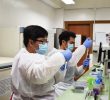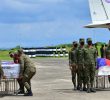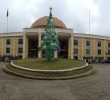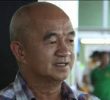“Ours was a prenda-arendo contract and we have agreed to plant organic rice only. Now, why are they forcing us to plant bananas?”– Gil Piquero, Chairperson of Kahugpungan sa mga Mag-uuma sa San Isidro
By DANILDA L. FUSILERO
Davao Today
KIDAPAWAN CITY, Cotabato, Philippines — With shovels and bolos (machete) in hand, some 20 farmers uprooted banana trees in their farms after a falling out with a foundation that was supporting them.
Farmers under the Kahugpungan sa mga Mag-uuma sa San Isidro (Kamasi) blamed their creditor, the Don Bosco Foundation for Sustainable Development, Inc. (Don Bosco), for deviating from their contract that was supposed to supply them with organic rice. They were forced to plant bananas due to the foundation’s financial problems.
In an interview with Kamasi chairperson Gil Piquero, their agreement with Don Bosco stated the latter will provide full financing and technological assistance while the farmer-owners will shoulder the labor and maintenance expenses.
“Prenda-arendo ang among kontrata ug organic rice ang sabot. Karon nganong pugson man mi sa saging (Ours was a prenda-arendo contract and we have agreed to plant organic rice only. Now, why are they forcing us to plant bananas?),” Piquero said.
Prenda-arendo is a practice of pawning an item like farm lots, for a certain period or number of harvests. Don Bosco, acting as pawnbroker, received Kamasi’s 22 members’ farm lots with every half-hectare farm lot costing 75,000 pesos (USD 1,773).
In prenda-arendo, the land will be returned to the farmers once the agreed period expires or the number of harvests completed, without the owner paying the amount given to him/her by the pawnbroker.
Piquero shared that hard times forced them to enter into a contract with Don Bosco. He lamented that while they each have an average of half-hectare farm lot, high prices of farm inputs coupled with household economic difficulties like education and food compelled them to accept Don Bosco’s offer last year.
The farmers wondered why Don Bosco forced them to convert to banana farming. During one of the mediations held by village officials, Don Bosco officials said they incurred losses in organic rice farming forcing them to convert to banana farming.
But Piquero said they could no longer wait for the banana plants to bear fruits, pointing out that, “Kinahanglan na mi motanom og humay para naay malung-ag (We have to plant rice so we’ll have something to eat).”
After two mediation meetings failed to reach an agreement, Kamasi farmers cut off every banana tree they planted.
“Pinaagi sa hiniusang lihok sa pag-ibot sa mga saging, kami nagpahibalo sa Don Bosco nga dili mi uyon sa ilang gusto (Though our unified action of uprooting the bananas, we are sending the message to Don Bosco that we are not amenable with their demand),” Kamasi Secretary Teresita Bacalso, 52, said.
San Isidro village chairman Merlito Tapere said either party can elevate the issue to the proper courts, saying that Don Bosco didn’t ask for their facilitation when they started to operate in San Isidro last year.
As the Kamasi farmers defied their creditor, they realized that government support through its agrarian reform program have brought little progress for them.
Kamasi farmers sought ownership of the 28-hectare farm lot through their application to the Comprehensive Agrarian Reform program. But to date, only few of them had been able to pay their respective bank mortgage.
“Dili lang diay igo nga mahatagan mi og yuta para mabuhi. Karon, human sa tulo ka dekada galisod gihapon mi sa among panginabuhian mao nga mapugos mi sulod sa kontratang disbentaha diay sa amoa (We’ve realized, it’s not enough to own a land in order to live decently. After three decades, our conditions remain, forcing us to enter into a contract that’s really one-sided, not in our favor),” Bacalso lamented.
Don Bosco is a non-government organization based in Batasan village, Makilala town. The foundation is known for its advocacy on organic farming and has been into merchandizing of organic farm products. It owns the Bios Dynamis Organic centers in the cities of Kidapawan, Davao and Manila.
As of press time, Don Bosco could not be reached for comment. (Danilda Fusilero/davaotoday.com)
World









